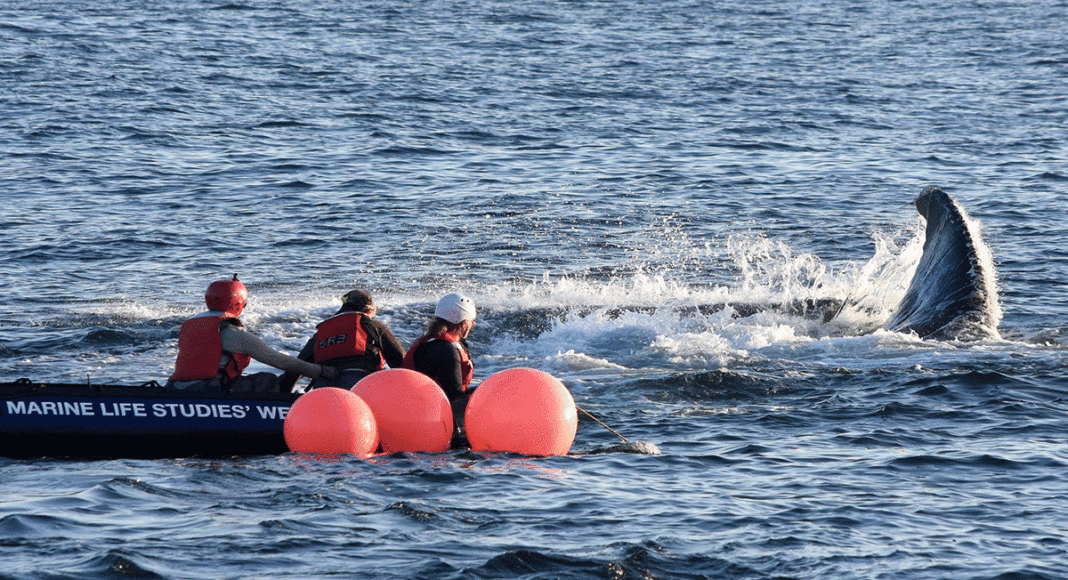Peggy Stap was ready when the call came in on a Sunday in October. A humpback whale was caught in what appeared to be a Dungeness crab line, likely dragged from Oregon to the Central Coast.
With the volunteer Whale Entanglement Team she oversees at research nonprofit Marine Life Studies, Stap drove north with her 40-foot boat Current’Sea, along with a wing boat recently acquired to help rescuers get closer to entangled whales. It was just before sunset when the team located the entangled humpback south of Half Moon Bay. They attached a satellite buoy to keep tabs on the animal’s location, and Stap stayed overnight to babysit the boat. The next day, the team was back in the water to cut the whale lose.
“The whale kept going south, and we ended up doing the rescue west of Santa Cruz,” says Stap, a Michigan transplant who has slowly grown Marine Life Studies and the entanglement team over the past 12 years. “Now we’re kind of like a whale ambulance.”
Stap’s nonprofit rescue team attempts to plug one humpback-sized hole in how state environmental agencies and ocean-focused advocacy groups respond to shifting biological and commercial dynamics in the Monterey Bay ecosystem. Increasingly, variable water temperatures, acid levels and food patterns have contributed to unanticipated interactions between wildlife and the region’s famous fishing industry, according to researchers at the Monterey Bay Aquarium Research Institute.
Groups like Stap’s have also increased vigilance to spot incoming issues, like whales that may have been injured elsewhere but then traveled to local waters. In addition, multiple state working groups have formed to respond to fast-evolving ecological issues including whale entanglement, which surged in 2015 and 2016 to more than 20 entangled whales spotted in the Monterey Bay alone, up from a small handful in years prior.
In the fall, the California Dungeness Crab Fishing Gear Working Group, formed in 2015, released a new round of recommendations for the year ahead, from better mapping of ocean feed patterns to better identification of fishing lines. While Stap says the local crabbing industry in particular has been active in finding potential solutions to entanglement, options like quick-release lines or advanced materials often remain prohibitively expensive.
“If you look at the bigger picture, [with] two-thirds of the entanglements, we don’t even know what fishery they’re from,” Stap says. Difficult-to-assemble data on the wide world of marine habitats also add to the challenge. “Every year is different. We haven’t gotten all the numbers for 2018.”
Stap’s quest to buy the Whale Entanglement Team’s new rescue boat, which GT covered last summer, also illustrates a rethinking of how resources are deployed by local ocean-focused nonprofits and businesses. This month, ocean wildlife will be a focal point of Cal State Monterey Bay’s second-annual Sustainable Hospitality Summit from Jan. 10-12, plus the ninth-annual Whalefest at Monterey’s Old Fisherman’s Wharf on Jan. 26-27 (where Stap will speak).
After naming whale entanglement one of its top three priority issues last year, the nascent Monterey Bay National Marine Sanctuary Foundation also hired its first full-time executive director in the fall. A year-old local branch of marine sanctuary foundations located near federally protected waters across the country, the Monterey Bay chapter hired longtime local surfer and former world longboard championship competitor Ginaia Kelly to lead the group.
“It was a very, very natural fit,” says Kelly, whose board at the foundation includes former Defense Secretary Leon Panetta, former Santa Cruz Mayor Hilary Bryant, interim O’Neill Sea Odyssey Executive Director Dan Haifley and other prominent figures in government and conservation causes. “While I have boots to the ground here locally, our connection to the national foundation can help us gain greater visibility.”
The federal government shutdown at the start of 2019 has furloughed much of the local staff for the Monterey Bay Marine Sanctuary, but Kelly says her group also plans to focus on water quality monitoring, naturalist training and education programs. A resident of Davenport, Kelly headed Save Our Shares and other organizations before accepting the role with the Marine Sanctuary Foundation.
Meanwhile, Stap says Marine Life Studies continues to host volunteer trainings and raise funds for specialized response equipment after welcoming a new federally trained level-four whale entanglement responder last year. The group is also in need of licensed drone operators to help with whale monitoring and assessment.
“We are one of the busiest sanctuaries,” Stap says, though she knows demand for her services will always come down to nature. “It just depends where the fish are, where the krill are, where the anchovies are.”














